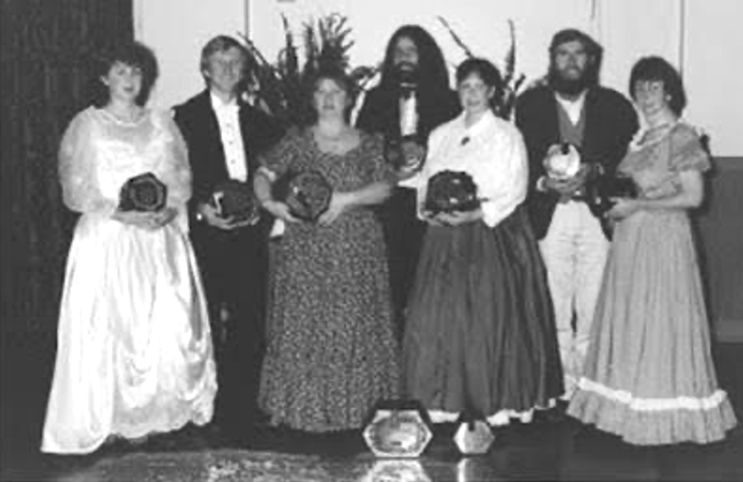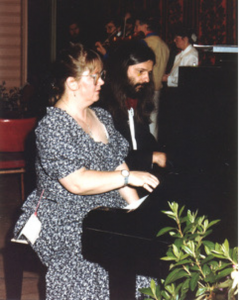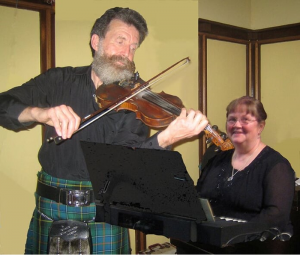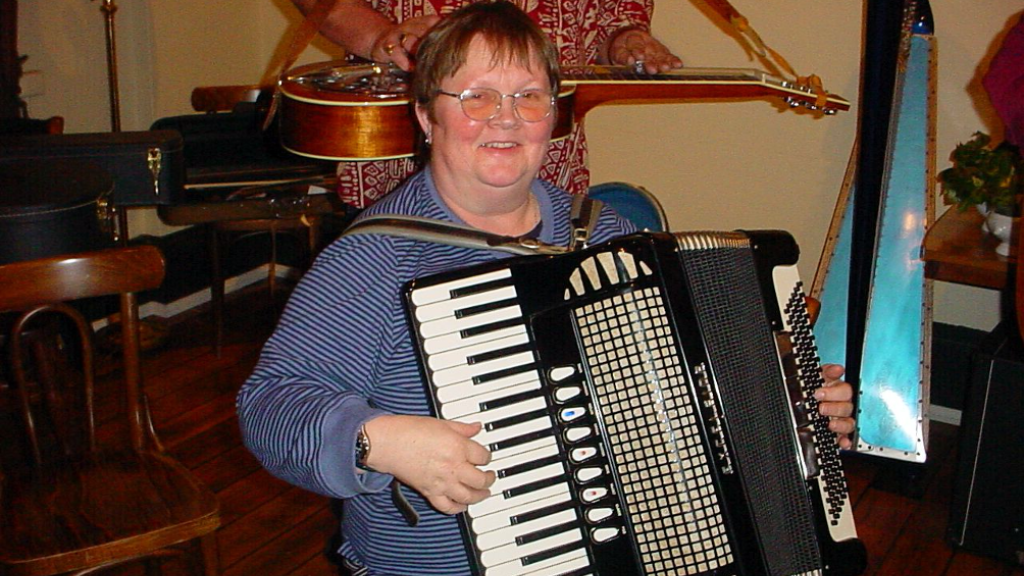Polly Garland was well-known in the Australian folk music world as an extremely talented multi-instrumentalist, a superb accompanist and music teacher, and a friendly face with a playful sense of fun. She was expert on piano, piano accordion, autoharp and various types of duet concertinas, but could also play anglo and English concertina systems. She also played harps, banjo, violin, cello, mandola, ukulele, Ukrainian Bandura, tin whistle, recorder, mouth organ, electric guitar, bass guitar, dulcimers, diatonic button accordions and other instruments.
Polly was born Angela Garland in England in 1945. Her musical career started at a very young age, first on the recorder, then piano, for which she achieved very high grades during her early teens. She played cello in several youth orchestras, and the grand pipe organ at a number of venues in Bristol. She achieved qualifications as a teacher and in secretarial work and had great success in both, especially teaching piano and other instruments.
In England Polly met and married Malcolm Clapp, one of Australia’s few, and much in demand, concertina and accordion repairers, back visiting his native UK. She changed her name from Angela to Polly, saying she felt she had “never lived up to the expectations of being ‘an angel’, and she liked the sound and Englishness of the name Polly”.
Malcolm was “instrumental (and apologises for the pun), in introducing Polly to the concertina, piano accordion and folk music”. He says she “took to the concertina like a duck to water”, especially the duet, which she was playing reasonably well within a few weeks. Polly’s sight-reading skills were “magnificent”, but “ear-playing for folk music was a challenge for her initially”. Then a “health scare concerning her eyesight, worried her to the point that she determined to master playing by ear… just in case.” Polly had to learn to loosen up for playing in the folk world, after the strict formality of her classical background. Malcolm learnt a lot from Polly, especially in music theory and the use of chords.
While in England, Polly and Malcolm regularly attended the West County Concertina Players sessions, and travelled to London for International Concertina Association meetings, where classical pieces, hymns and wartime hits were the norm. They decided to risk trying to “liven things up a bit by playing ‘Puppet on a String’, and it went down surprisingly well, so they were asked later to play it again. They camped it up, accompanied by a couple of the strait-laced regulars reading over Polly’s shoulder, amidst much clapping, foot stomping and merriment.” Polly later described it as a “spontaneous act of vandalism on the hallowed ears of the ICA”.
Another story from Malcolm is that “Polly met renowned concertina player Alistair Anderson at the UK’s Sidmouth Folk Week in 1983, after she had been playing concertina for less than a year. He briefly heard her playing some Bach on the Triumph duet concertina and was so impressed that he invited her to play on stage with him at a concert later that week, where they played some Bach together in front of a large audience. Alistair must have seen something special about Polly’s playing to have taken such a chance with putting her on stage completely unrehearsed, though she was, of course, no stranger to Bach from her organ playing days. She certainly wasn’t stage-struck, just quietly confident, got up there and did it and let the music speak for itself. Surely one of the highlights of her musical career.”
In 1985 Polly and her son Daniel Mason from a previous marriage, moved to Australia, where they lived with Malcolm in Sydney, then Woy Woy, where Polly did secretarial work and taught music. The Bush Music Club had been active for decades in promoting Australian bush music, dance and song, particularly in the Sydney region. Polly immersed herself in the folk scene, where she made many great friends and had many wonderful experiences. Helen Romeo remembers Polly’s musical talent, and “how appreciative and encouraging she was of other people’s musicianship, no matter what stage they were in their musical journey”. Polly loved a good tune, no matter where it came from, and loved playing tunes in parts, so she soon began attending the newly established concertina sessions at Tritton Hall, and was a founding member of the Australian Concertina Band, then played with it for many years.

1985 founding line-up of the Australian Concertina Band with Helen Romeo (nee Brain), Kingsley Forbes-Smith, Polly, Beth Cambridge

1994 line-up: Mary-Louise Anderson, Kingsley Forbes-Smith, Polly Clapp, Wayne Richmond, Helen Brain, Greg Wilson, Beth Cambridge
Greg Wilson remembers how Polly’s fabulous musicianship contributed enormously to the Concertina Band. “She gave the Concertina Band some great English music, including a great tune ‘The Ironbridge’ by Alistair Anderson, which 35 years later” Greg has “learnt on the concer from sheet music hand-written by Polly. It is fairly complicated with 5 parts that can all be played together, and the tune is now part of the ‘Springtide’ band repertoire and also the English session group. A great legacy from Polly.”
Polly regularly played for Heritage Balls, with the Heritage Ensemble, and was with them when they recorded the ‘Blue Book’ of tunes and dances in 1988. Fellow duet-player, and fiddler, Ralph Pride says he “was in awe of Polly’s ability with the Crane duet concertina system”.

1985 Heritage Ensemble Back – L-R Richard Evans, Greg Wilson, Roy Harbour, Dave Johnson, Ralph Pride, Craig Collis. Front – Polly, Helen Romeo (nee Brain).

A Heritage Week Ball in the Sydney Town Hall in the mid to late 1980s, with Polly on concertina. Bob Foggin, Ralph Pride, Roy Harbour, Dave Johnson (back view – on conductor’s chair), Annette Dwight, Greg Wilson, Helen Romeo, Polly Clapp, and Leo Dent (on piano)

Wayne Richmond recalls “what a remarkable musician Polly was”. They had fun doing a ‘piano four-hander’ for ‘the Lancers’ dance at the Heritage Balls”.
While in Sydney, Polly briefly played with Bob Foggin’s Redback Bush Band, replacing Malcolm in the line-up when he got regular gigs with the band ‘1988’ at the Vinegar Hill Woolshed.
Polly and son Daniel lived in the Illawarra through the nineties, at a time when it was becoming a hub of bush/colonial dance music with the rise of the Wongawilli Band and Dancers. Polly was teaching piano, and became involved in the Illawarra Folk Club, the weekly dances at Wongawilli Hall and the Jamberoo Folk Festival committee. Her musical activity in the Illawarra also included accompanying a classical Italian singer, and some Blues with singer Ali Barber. Through Illawarra Folk Club activities she met Bob McInnes, and became accompanist in his Stringfiddle band, playing for many concerts, dances and balls at folk clubs and festivals, and at private gigs. Bob recalls that when playing for the movement in ‘the Lancers’ which requires the same sixteen bars of music repeated many times, he told Polly “we’ll just change keys, working our way up the scale, and Polly didn’t bat an eyelid!”

Stringfiddle years – Polly accompanying Bob McInnes
Polly helped David de Santi and Rob Willis on some of the early Pioneer Performers monographs, transcribing material from recordings and playing in the groups they assembled at festivals to create an awareness of the publication. Rob remembers Polly as “a good friend and mentor”.
In the late nineties Polly and Richard Depledge moved to a small farm near Cobargo on the NSW far south coast. Polly was still teaching piano, and she and Richard got involved in the local folk club (Yuin) and the local (Cobargo) Folk Festival committee, and Polly played at regular sessions at Cobargo and Candelo. The rural property allowed Polly to build up a full menagerie, and indulge her fascination with donkeys…Richard says…“Polly never did anything by half!”. Polly had said that her donkey fascination “stemmed from childhood memories of donkey rides on a UK beach”. Polly’s daughter-in-law Fiona recalls that she and Daniel had many visits to Cobargo and those ‘special’ donkeys. Sadly, this property, where Richard was still living, was destroyed during last summer’s bushfire, but luckily Richard got out in time.
Bob McInnes recalls that during Polly’s time on the far south coast, she gave him a chance to reconnect with the world of Scottish Country Dancing. She had played solo on piano accordion for a Scottish Country Dance, to help a local dance teacher get that dancing genre happening in the area, and the following year it became an annual event, with Bob on fiddle and Polly piano. So Polly was in the Stringfiddle line-up for dances and balls for many years, from the south coast to Canberra and Sydney, and once they filled in at the Maitland Colonial Ball, when the resident Coalbrook Band was overseas. Bob remembers his “association with Polly with fondness and gratitude”.
I met Polly through the Wongawilli mob in the mid-nineties, on a wonderful bus trip, playing, dancing and singing our way to South Australia’s Victor Harbour Festival. I remember appreciating not only how competent Polly’s playing was, but also how open, friendly and helpful she was, and that irreverent sense of humour….and I noticed she was a ‘junk shop junkie’. Along with a hard-core treasure-seeking crew, Polly was always keen for the bus to stop at second hand shops. Bob McInnes confirmed this penchant of Polly’s for op shops, saying whenever they were travelling to gigs “Polly wanted to stop to check for old concertinas”. Back in UK days, Malcolm and Polly had also scoured junk shops for sheet music, and Malcolm said that so talented was Polly, “that she would sing the tunes to see whether they were worth buying”. According to Wayne Richmond, this quest for wonderful tunes continued each year in Australia, when at ‘The National’, he and Polly “went to the Festival Shop and bought up all the tune books” then they found a nook to try them out.
Bill Galer, with whom Polly shared her last sixteen years, in both Canberra and the Brisbane region, says he too met Polly through Wongawilli, “at their Folk Music School around 2004, when taking one of her accordion classes. Bill says “she was wonderful with people and often started friendly conversations with complete strangers.” In Canberra, as in previous places she had lived, Polly immersed herself in the folk music world. Moir Holmes shared that Polly was “an ‘elder’ in the weekly TiNMuG (the Tuesday Night Music Group, an activity of the Monaro Folk Music Society), which Polly and Bill attended as recently as two months ago”. Moir says that “Polly was so generous with her musical knowledge, encouraging others, helping to correct chords, suggesting new tunes, and she was just as happy with the simplest tunes played well as with more challenging ones”.
Polly and Bill participated in activities of the Bush Traditions organisation which, like the Bush Music Club, focusses on Australian music, dance, song and folklore. It was established in 2006, after a Folk Alliance conference at the National Library highlighted the continuing need to foster Australian content in folk festivals and other folk events. Dave de Santi and Wongawilli had initiated several festivals in the Illawarra for this purpose, but those had ceased. Ray Mulligan and Dave Johnson coordinated Bush Traditions annual ‘Gatherings’ at Goulburn’s Old Brewery for many years, then more recently at the Hartigan Centre, Yass. Since 2006 they have also coordinated daily Settler’s Sessions each year at the National Folk Festival, for teaching tunes. Ray says Polly also came to some of the ‘Settlers Sessions’ he ran in the Canberra Polish Club and Bowling Club, and he has memories of playing some lovely waltzes with her in the community hall at Maldon festival about ten years ago.
Polly and Bill also participated in the Concertina Convergence, established a few years ago to bring Australian concertina players together. Polly and Malcolm’s lively duo rendition of ‘Puppet on a String’ from back in their UK days came full circle, as a treat for those who turned up at one of Con Con’s first events at the National Folk Festival.
Among other interests, Polly learnt Russian, and spoke some Italian and French, and Bill said “she had an insatiable interest in everything around her, as well as everything not around her (such as Iceland, Volcanos, donkeys, weather etc.)”. She was “a firm believer in the protection of the environment, and had no prejudices (except for dodgy politicians!).”
Polly had an intense interest in aircraft and flying, so Bill who worked as an Aircraft Engineer, shouted her a flying lesson for her 60th birthday. He says the flying instructor made her fly the aircraft after take-off at Essendon and around Melbourne, then let her complete the approach and landing herself with verbal instructions only. Bill wrote “I had never heard of anyone successfully landing an aircraft on their first flying lesson before, but I saw this all from the back seat.”

Flying High, and chuffed. A flying lesson for Polly’s 60th birthday
In 2018 and 2019, while in remission from her long battle with cancer, Polly enjoyed time with son Daniel and Fiona, and their two sons – Lycan, aged ten and Lazarus seven, in Tasmania’s Channel area, south of Hobart. While with them, Polly was involved in the Hobart Society of Recorder Players and the community music group ‘Huon Heritage’. Polly has two other sons, Julian in the UK, and Dominic in the Philippines, who has an eighteen-month old son Jacob.
Polly passed away peacefully in Canberra, with Daniel or Bill constantly with her during the last few days. She recalled the happy times that she had playing with so many friends at the National Folk Festival and other venues.
Polly always joked that she thought she must have had “a bit of gypsy blood”. Although we all knew her as ‘Polly’, she was known by a number of names through her life – from her birth name of Angela Garland, through Angela Mason, Polly Mason, Polly Clapp, and Polly Garland, then with the name on her coffin taking her full circle back to Angela Garland.
Although Polly said she qualified more as a ‘gypsy’ than an ‘angel’, the TiNMuG session’s Julie Szabo Banton contributed this photo of a ‘devilish gypsy angel’ in Polly’s favourite colour. Julie said that in Canberra, at Polly’s coffin a small group played some of her favourite tunes: Picking Berries, Mudgee Waltz, Westering Home, Mist Covered Mountain, and Polly’s beautiful arrangement of Highland Cathedral.

Vale Polly


Polly certainly had a sense of humour- when she first came to the Illawarra she lived at West Wollongong and was known to all and sundry as Polly Clapp. She was quite involved in the Folk Club and our Jamberoo Festival. I called around to see her one day about our newsletter and she told me she was no longer Polly Clapp but was now Polly Garland. I insensitively asked her why she had done this, Her answer has stuck with me until this day. She said:- “I was sick of going to the local chemist to get my medications and when they were ready the chemist would call ‘Prescription here for Clapp’, Of course I had to go forward and collect them with the whole chemist’s patrons staring at me” Vale Polly- great lady.
Many thanks Carole for this wonderful and informative tribute to an extraordinary woman.
Thankyou Carole for putting this together.
and thankyou to Polly, who introduced me to the duet concertina, encouraged the start the of the concertina band (why don’t you start a band Kingsley? I will be in it) and being so much fun to play music with. With all her knowledge and skills, she made the time to play and talk with others waaay less skilled (like me who didn’t understand anything about music). Thankyou Polly, a beautiful women, memories held in my heart.
What a wonderful tribute to a wonderful person. Thanks Carole. Her support,encouragement,character and passion will be well remembered.